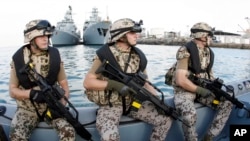BERLIN —
Germany is preparing to contribute troops to a European Union training mission in Mogadishu, less than a year after security concerns led Berlin to abandon a similar training operation when it relocated from Uganda to the Somali capital.
A foreign office spokesman said on Monday the decision to pull out had been taken by the previous government, but the situation in Somalia had since improved and Germany's new government, a coalition of Angela Merkel's conservatives and the Social Democrats (SPD), was considering joining.
The new government, which took office last December, has promised a more robust foreign and security policy, pleasing allies who have urged Berlin to play a larger role more commensurate with its size and wealth.
“The decision to return from the training mission was taken by another government. Now there is a new question facing us and the European Union about a training mission for Somalia, in Somalia, which is being decided upon,” the foreign office spokesman told a regular government press conference.
“We have decided that it could be justifiable to go there again and preparations are in place,” a defense ministry spokesman said.
Almost 5,000 German personnel are currently taking part in nine international missions, including more than 3,000 in Afghanistan, mostly working on training local security forces.
Foreign Minister Frank-Walter Steinmeier, a Social Democrat, said earlier this month that with Europe increasingly hemmed in by conflicts in the Middle East, Africa and Eastern Europe, “Germany, with all its diplomatic, military and aid capacity cannot stand by when its help is needed”.
Last May, the EU agreed to move military training of Somali soldiers from Uganda to Mogadishu in a show of confidence in Somalia's growing stability after two decades of turmoil. The mission had trained some 3,000 Somali soldiers and officers in Uganda since 2010.
The foreign office said Steinmeier was hoping to come up with a broader concept for German engagement with Africa, comprising not just contributions to training or stability missions but also exploring trade opportunities.
A foreign office spokesman said on Monday the decision to pull out had been taken by the previous government, but the situation in Somalia had since improved and Germany's new government, a coalition of Angela Merkel's conservatives and the Social Democrats (SPD), was considering joining.
The new government, which took office last December, has promised a more robust foreign and security policy, pleasing allies who have urged Berlin to play a larger role more commensurate with its size and wealth.
“The decision to return from the training mission was taken by another government. Now there is a new question facing us and the European Union about a training mission for Somalia, in Somalia, which is being decided upon,” the foreign office spokesman told a regular government press conference.
“We have decided that it could be justifiable to go there again and preparations are in place,” a defense ministry spokesman said.
Almost 5,000 German personnel are currently taking part in nine international missions, including more than 3,000 in Afghanistan, mostly working on training local security forces.
Foreign Minister Frank-Walter Steinmeier, a Social Democrat, said earlier this month that with Europe increasingly hemmed in by conflicts in the Middle East, Africa and Eastern Europe, “Germany, with all its diplomatic, military and aid capacity cannot stand by when its help is needed”.
Last May, the EU agreed to move military training of Somali soldiers from Uganda to Mogadishu in a show of confidence in Somalia's growing stability after two decades of turmoil. The mission had trained some 3,000 Somali soldiers and officers in Uganda since 2010.
The foreign office said Steinmeier was hoping to come up with a broader concept for German engagement with Africa, comprising not just contributions to training or stability missions but also exploring trade opportunities.





